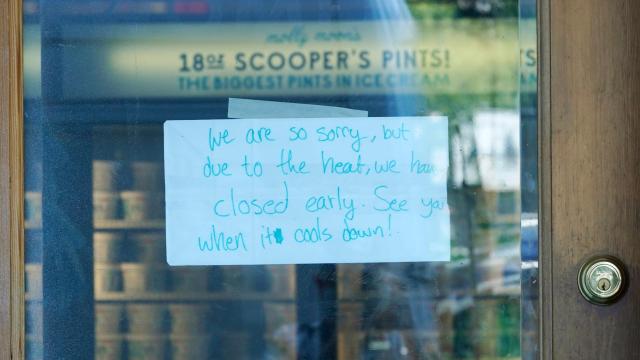The record-setting heat wave ripping through the Pacific Northwest right now has already melted critical infrastructure, killed hundreds of people across the region, and closed countless schools. It came for grocers, too.
Insider was first to report that grocery stores across Washington state have taken extreme measures to keep up with the historic high temperatures, like covering refrigerated goods with plastic or pulling perishables like meat and veggies off the shelves entirely. And that’s before store’s freezers and fridges start to malfunction from the staggering temperatures. Though the worst of the heat has passed for many regions, it goes to show just how bad things were.
“Meats, deli meats, bagged salads — they’re all off the shelves right now according to the store,” said one reporter based out of a Seattle Fox affiliate. “When you walk inside, you’ll notice rows and rows of empty shelves, normally refrigerated areas closed up, and those items removed as well.”
On social media, customers shared scenic views featuring rows of deserted shelves or recounting how their local chains — like the Kroger affiliate Fred Meyer — have turned to rooftop sprinklers to keep cool. Other posts showed the plastic sheets that some of these retailers have pulled over perishables to keep cool air in.
As for what’s happening to the perishables that get pulled off shelves, the Fox affiliate reported that in at least one case, most of it just ends up… thrown away.
Of course, this is an issue affecting other local eateries, too, with countless locals closing up shop simply because their equipment can’t withstand the 100+ degree temperatures. And because temperatures inside of food carts can often be more than a dozen degrees hotter than the blistering heat outside, food cart owners have had to close up shop, too, either from damage to equipment or because the heat was too much to bear. One operator told CNN earlier this week that he “[didn’t] know how food carts are going to be able to manage through this.”
Local food producers also suffered the wrath of blistering temperatures. Shellfish like clams and oysters were wiped out, with at least one oyster company seeing thousands of clams just littering the beach and rotting in the sun.
“Usually when you see a dead clam on the beach you just see the shell,” Lissa James Monberg, marketing director of her family’s Hama Hama Company, told The Takeout. “You don’t see the meat. These images are scary because the clams are full of meat… they’re literally just sitting there cooked.”
The reason for the bizarre scene, Monberg said, might have been because there were more clams than scavengers could clean up. It goes to show how the climate crisis can upend everything from the food system we rely on to the ecosystems… that we also rely on.
